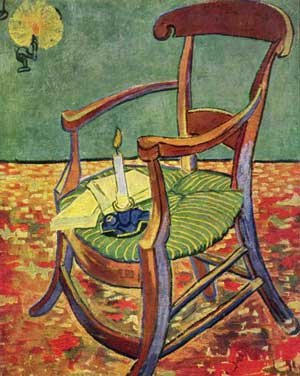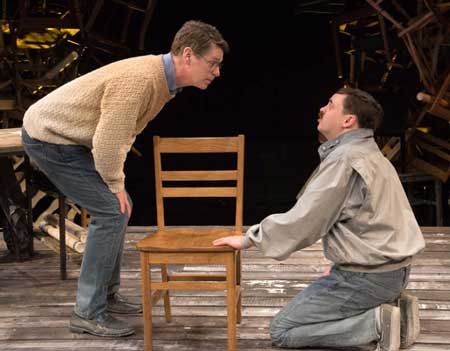Play (1994)
by Steven Dietz
Directed by Jim Petosa
New Repertory Theatre
Co-produced with Boston Center for American Performance
Arsenal Center for the Arts
February 3 – March 4, 2018
With Michael Kaye (Jody), Tim Spears (Carl)

“Gauguin’s Chair” (1888)
Jody (Michael Kaye) runs a small map store in an unspecified city. The time is some time ago – the play was written in the 1990s – and Jody’s store is frequented by Carl (Tim Spears), who, for an initially unspecified reason, continues to bring chairs into Jody’s shop; they pile up, and the shop can barely contain them all. What at first just seems an absurdist fascination turns into evidence of palpable community loss and Carl’s and Jody’s participation in that devastation and the challenge it poses to their friendship become the substance of the drama.
When one sees the chairs piling up in the first act of this play, one easily recalls the absurd setting of Ionesco’s The Chairs (1952), which in fact gets significantly mentioned in this script. The absurdist overtones of the Ionesco play work themselves into this more human drama; with a growing dramatic sense, however, it becomes apparent that Carl’s collecting of the chairs is not simply to reflect the absurdity of life in general but is a direct response to the immediate and widespread devastation by AIDS.

Tim Spears as Carl
in “Lonely Planet”
Photo: Andrew Brilliant/ Brilliant Pictures
Courtesy of New Repertory Theatre
Jody and Carl are gay, but not lovers. Apart from their acquaintance through Carl’s popping into Jody’s store, there is not much intimacy. Dislocated in all kinds of ways, Carl parades various extreme fantasies of what he does for work. It is evident that the loneliness of the planet on which he exists thrives on his incapacity to adapt to life, exacerbated significantly by confrontation with widespread death. This personal dislocation, however, does not prevent Carl from holding forth, in a constant philosophical stream, about the absurdities of life, Nevertheless,when the occasion demands it, Carl tenderly provides needed support to Jody.
The map-store context provides a metaphor for the notion of two lonely, independent gay men, trying in some fashion to form a friendship despite their own inclinations to isolation. Lots of talk about maps and how they get warped or stretched helps frame that undercurrent. There is even a nice moment when Carl tears an orange in a certain way to emphasize the quality of a particular kind of two-dimensional map.
Kaye and Spears work together quite well. Spears’ Carl is really out there, demonstratively histrionic as his character seems to require, while Kaye’s Jody provides, in cautious receptivity, a frame for Carl’s outlandishness.
This play, now almost twenty-five years old, hearkens back to that heartbreaking time in the 80s and 90s when AIDS was mostly a fatal diagnosis. In framing that, Dietz’ play captures something important about mortality and isolation. Though the play’s metaphors are lathered on thickly, this intimate production, in its best moments, effectively transmits that significant dramatic undercurrent.
– BADMan
Leave a Reply